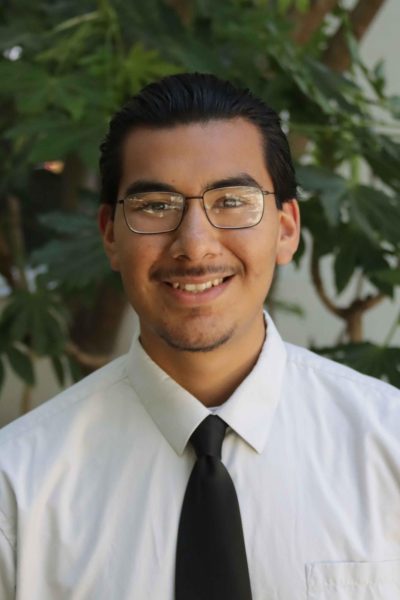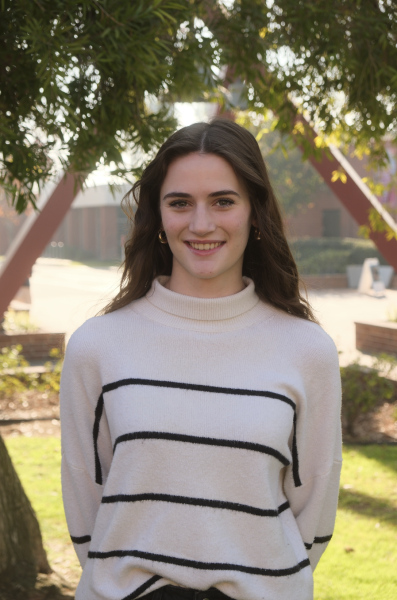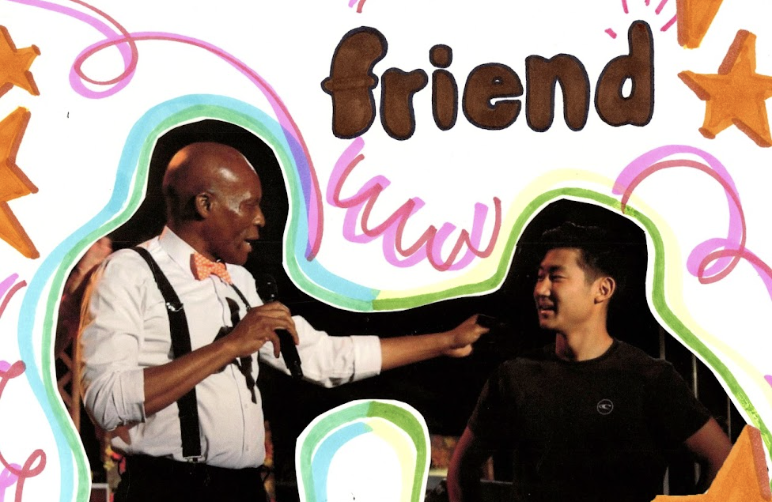At the start of every semester, the Torrey Honors College holds a series of lectures for each class of students called “Why You Read What You Read,” wherein a handful of professors review the course reading list and draw upon the larger intellectual discourse at play. Their answer to the larger “Why?” question is clear: each text plays a small role in a greater conversation. While each book doesn’t individually answer the question, together, they aid in the development of a single answer — or, the revelation of a single Truth.
So, why aren’t more students listening in on the conversation anymore? The numbers are in: college students can’t — no, they won’t — read. Literacy rates among US adults have been on a concerningly steady decline over the past couple of years, found a study by the National Center for Education Statistics. In fact, a 2024 study by the National Literacy Institute found that 54% of literate US adults have less than a 6th-grade reading level, and 20% are below a 5th-grade reading level. The 2020 COVID pandemic also significantly impacted, if not further revealed, this absenteeism in the reading community.
In short, people just don’t want to read books anymore, and those who do aren’t reading at an appropriate level of competency. Joshua Smith, assistant professor at the Torrey Honors College, offers a clearer explanation.
“From the outside looking in, I think there’s a strained relationship college students have to reading, because of just where the world is with reading in general,” said Smith. “People’s tolerance for long-form reading is just not as great.”
This is especially evident within younger generations. Comic books are tame now compared to the colorful short-form content plaguing our Instagram feeds. Even among avid readers, genre fiction and pop-psychology are the most prevalent texts-of-choice.
“We live in a distraction culture,” said Smith. And among the cacophony of pleasing distractions, this greater conversation becomes nothing more than a series of distant murmurs on the abandoned library shelves.
READING IS REBELLION
In a world governed by whoever has the sweetest tongue, competencies in literacy are extremely valuable.
“To be an increasingly illiterate culture is to be an increasingly narrow, inflexible and dangerous culture,” said Adam Johnson, associate professor at the Torrey Honors College.
While short-form content offers immediate access to vast springs of information, only books offer enough to quench the reader’s thirst for something more.
However, not everyone is in agreement. An article by Higher Education Marketing advocated for digital learning through short-form content, arguing for its accessibility with English Learners, as more information can be gained within a short period of time. Of course, you can eat more when you eat faster, but at that point, what exactly is being gained? Is it actionable knowledge, practical wisdom, or just dead-weight facts?
“[I]n this digital age, people can quickly consume as much as they want and quickly realize the shallowness of it,” said Smith.
Based on my experiences at all-you-can-eat-buffets, I must confess that a time does eventually come where one gets bloated beyond belief. Likewise, rapid consumption of information ultimately leads to a bloated brain; and, without the needed time for digestion, or reflection, people are likely to passively accept rather than assess. Conversely, the very act of reading combats this act of stuffing one’s mouth full of knowledge-food. It necessitates immediate reflection with every word. Each page is arranged so that every line must be read in full before you can drag your eyes toward what feels like the last, but is only another line below it.
Most importantly, the book doesn’t speak at you in high-pitched tones and fast speeds. There’s no background music or Subway Surfer gameplay to satiate the much-needed stimulation of our modern brains. And, there’s no summary, no “TLDR” (short for the phrase “Too Long; Didn’t Read”) at the end of the book to offer a synthesized explanation.
“Ultimately, [reading] is about the slow, painful process of stepping outside of yourself, of taking someone else’s carefully thought… into thorough and careful consideration,” said Johnson, “taking seriously the possibility that you might need to change in response.”
Reading isn’t just about learning — reading is a practice in virtue. It requires a humility from the reader: a physical posture of reverence to look down at the book, right in the eyes to really listen to it. It isn’t about the words on the page — it’s about a principle that transcends the need to learn, but rather reaches the greater need to change.
“Reading pursues something vastly richer than information — it is about transformation, about submitting our minds to others as a part of our submission to the truth,” said Johnson.
People will eventually want that something-more, the kind of thirst only a good book can satisfy.
“[I]t’s not till later that you’re like, ‘I’ve been eating all this junk food. I think I want a home cooked meal,’” said Smith.
The something-more that comes with reading is directly connected to that universal desire for something-more: the one discovered when you realize that more is needed to satisfy, and not just please.
READING IS A RISK
As with all things, there’s a tradeoff: time. And we’re only given so much of it.
According to findings by LitHub, the average 80-year-old male reader will only get to read 108 books in their lifetime. Additionally, the average 90-year-old female reader will only get to read 120 books. Reading is ultimately a risk. We don’t have space to spare a word.
So why not start with the Word that spared you?
With over 158,464,880 books existing in the world at this very moment, according to a study on worldwide ISBN catalogs by Google, there has to be at least one book that’s written for everyone. The most obvious of these books is the Bible: the book built on the Word, the one that provides the something-more we all can’t get enough of. The Bible is an anthology of various genres — short stories, poems, dramas, legal documents, scriptural exhortations, historical chronicles, genologies, and construction plans, to name a few. It’s here that answers are plainly spoken: “I am the way, the truth and the life,” said Jesus Christ in John 14:6. However, answers aren’t plainly given.
Through its obscure catalog of genres, the Scriptures enable us to not only receive, but to reflect on the divine revelations from God to Man.
READING IS WORSHIP
Reading in itself also grants us the needed time to reflect. It is a give-and-take that gives more than it takes. Of course, that process of giving back only takes time.
“The human experience requires that we give it attention for it to be rich,” said Smith. “And we need … the humanities to help us to do that. You want to have engagement with higher order ideas that come across in great works of art, because great works of art require things of you. You can’t just passively consume it.”
Bernard of Clairvaux expands onto this intentionality with consumption in his treatise “On Loving God.” In it, he presents a four-degree structure to unity and transcendence with God, the third degree of which involves an earnest pursuit of the knowledge of God through the intentional study of His words in Scripture. Reading the Bible is worship, according to Bernard — an expressed intimacy with God through an intimacy with His words. It gives as the readers give: unselfishly.
“The end result of my thinking, and to some extent, my character, can be informed by pondering those things [found while reading], and then indirectly, it informs how I engage with the world,” said Smith.
As noted, this process requires a sense of humility and intentionality from the reader. But, it should also take into consideration the intimacy that comes with the experience of reading in itself: of entering the mental space of another human being. Or, as is the case with Augustine of Hippo, the space of that something more.
Augustine, in his autobiographical “Confessions,” offers a notable illustration of reading’s transformative effects on the self. In Book IX, Chapter 10, Augustine and his mother Monica become transfixed in Scripture. They read and discuss their interpretations — so much so that they feel a sudden transcendence to the upper plains of existence. Their intense connection to the word on the page takes them to the literal Word God in Heaven.
Reading is transformative. It gives more than it takes — and it doesn’t take much to read. It all starts with one’s posture toward the text, by shifting one’s view of reading not as a task to be completed but an experience to be had.
“To apply Paul’s argument to the Galatians, to read for an assignment is to read as a slave or as a child — as a work,” said Johnson. “To read a book for oneself is to read as a free man and woman, as an adult — as a grace.”
A WORD ON WORDS
Reading is a patient endeavor. A person is tasked with setting up their experience with a book each and every time they feel that itch to read. They must take the book to their own space, do the work to turn each page, carefully inspect each word with reverence, all with the hope that it will ultimately satisfy. Most of the time, it doesn’t; at least, it can’t — not at first. But eventually, the words settle into the folds of your brain, and it’s then that the book gives — not only enough to please, but to satisfy with something more.
It’s then you realize that the work was already finished. Others have done the work of asking the harder questions. Others have done the work of carrying the weight of an answer, enough to set down on the page. Others have done the work of binding those answers shut – just enough so that the words won’t spill out, but open just enough for you to write your own words in. Other have found the answer, though the conversation continues. These others have done the work, and done something more, enough for themselves and for you.
So for the love of God, pick up and read. It only takes two simple steps: start at the beginning of the page, then make your way down to the end. Go at whatever pace or direction feels right to you, but make that movement, and move intentionally. Turn to the next page. Repeat.







